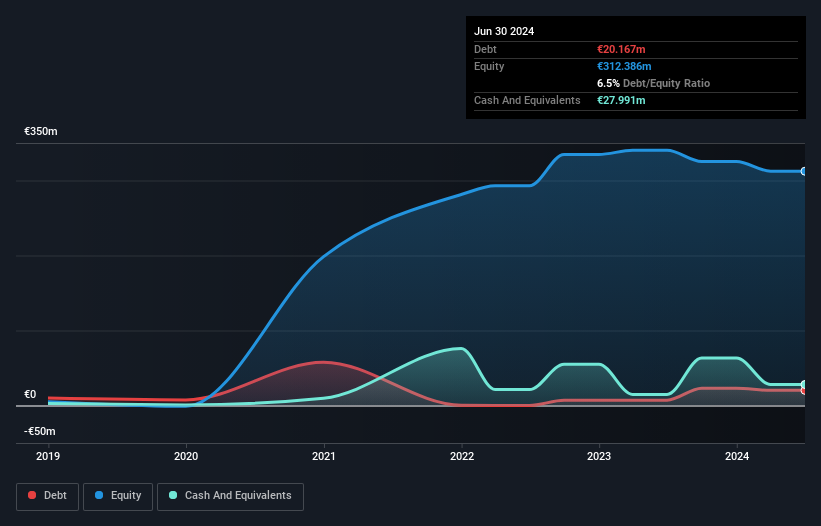Legendary fund manager Li Lu (who Charlie Munger backed) once said, 'The biggest investment risk is not the volatility of prices, but whether you will suffer a permanent loss of capital.' It's only natural to consider a company's balance sheet when you examine how risky it is, since debt is often involved when a business collapses. We note that tonies SE (FRA:TNIE) does have debt on its balance sheet. But is this debt a concern to shareholders?
When Is Debt A Problem?
Debt is a tool to help businesses grow, but if a business is incapable of paying off its lenders, then it exists at their mercy. If things get really bad, the lenders can take control of the business. However, a more frequent (but still costly) occurrence is where a company must issue shares at bargain-basement prices, permanently diluting shareholders, just to shore up its balance sheet. Of course, plenty of companies use debt to fund growth, without any negative consequences. The first thing to do when considering how much debt a business uses is to look at its cash and debt together.
View our latest analysis for tonies
What Is tonies's Net Debt?
You can click the graphic below for the historical numbers, but it shows that as of June 2024 tonies had €20.2m of debt, an increase on €7.17m, over one year. But on the other hand it also has €28.0m in cash, leading to a €7.82m net cash position.

A Look At tonies' Liabilities
The latest balance sheet data shows that tonies had liabilities of €128.4m due within a year, and liabilities of €43.5m falling due after that. Offsetting this, it had €28.0m in cash and €41.2m in receivables that were due within 12 months. So its liabilities outweigh the sum of its cash and (near-term) receivables by €102.7m.
Since publicly traded tonies shares are worth a total of €825.3m, it seems unlikely that this level of liabilities would be a major threat. However, we do think it is worth keeping an eye on its balance sheet strength, as it may change over time. Despite its noteworthy liabilities, tonies boasts net cash, so it's fair to say it does not have a heavy debt load! When analysing debt levels, the balance sheet is the obvious place to start. But ultimately the future profitability of the business will decide if tonies can strengthen its balance sheet over time. So if you want to see what the professionals think, you might find this free report on analyst profit forecasts to be interesting.
In the last year tonies wasn't profitable at an EBIT level, but managed to grow its revenue by 37%, to €395m. With any luck the company will be able to grow its way to profitability.
So How Risky Is tonies?
While tonies lost money on an earnings before interest and tax (EBIT) level, it actually generated positive free cash flow €1.9m. So taking that on face value, and considering the net cash situation, we don't think that the stock is too risky in the near term. One positive is that tonies is growing revenue apace, which makes it easier to sell a growth story and raise capital if need be. But that doesn't change our opinion that the stock is risky. For riskier companies like tonies I always like to keep an eye on the long term profit and revenue trends. Fortunately, you can click to see our interactive graph of its profit, revenue, and operating cashflow.
If you're interested in investing in businesses that can grow profits without the burden of debt, then check out this free list of growing businesses that have net cash on the balance sheet.
New: Manage All Your Stock Portfolios in One Place
We've created the ultimate portfolio companion for stock investors, and it's free.
• Connect an unlimited number of Portfolios and see your total in one currency
• Be alerted to new Warning Signs or Risks via email or mobile
• Track the Fair Value of your stocks
Have feedback on this article? Concerned about the content? Get in touch with us directly. Alternatively, email editorial-team (at) simplywallst.com.
This article by Simply Wall St is general in nature. We provide commentary based on historical data and analyst forecasts only using an unbiased methodology and our articles are not intended to be financial advice. It does not constitute a recommendation to buy or sell any stock, and does not take account of your objectives, or your financial situation. We aim to bring you long-term focused analysis driven by fundamental data. Note that our analysis may not factor in the latest price-sensitive company announcements or qualitative material. Simply Wall St has no position in any stocks mentioned.
About DB:TNIE
tonies
Through its subsidiaries, develops, produces, and distributes digital, cloud based, and interactive audio platform and entertainment system for children in Germany, the United States, the United Kingdom, and internationally.
Flawless balance sheet with reasonable growth potential.
Market Insights
Community Narratives



